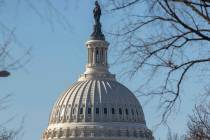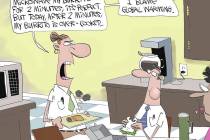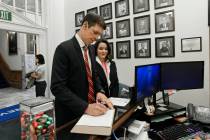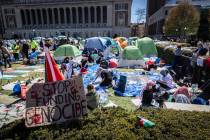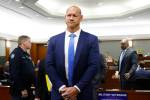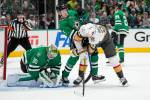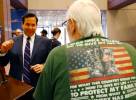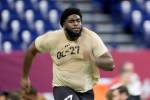Hillary’s romp hits a bump
It was inevitable that Hillary Clinton's triumphant romp to the Democratic presidential nomination would be slowed, which is not to say derailed or even tripped.
It's the nature of the game. Front-runners always start to coast and the press always gets restless. And it's the nature of her, since she is disciplined to a fault.
Some of us said in the 1990s that Clinton was not so politically gifted, but a tad tin-eared and ham-fisted. We weren't wrong at the time. But it had seemed for the past several months that we were outdated. It had seemed that our assessment was rendered moot by her liberation from the frustrations of a confining supporting role to a bad boy and her relocation to the greater ease of center stage.
But then we had a moment of renewed prescience Tuesday.
Hillary's debate performance that evening was quite bad -- in its lack of substance, her absence of charm and the revival of her coldness, aloofness and irritation. She would have been better off throwing her head back in that contrived cackle.
She came in knowing the others would come after her. She was determined to deflect whatever they charged as insignificant, and thus make them look desperate, while she spouted safe and popular talking points and couched everything as about her against the Republicans.
It wasn't such a bad plan. But it failed for lack of graceful or competent execution.
She either didn't answer questions at all or took both sides of them. She was for and against New York Gov. Eliot Spitzer's proposal to let illegal immigrants get driver's licenses. She was for and against reforming Social Security. When Tim Russert caught her saying she wasn't in favor of something she had previously been quoted as saying made a lot of sense, she shrugged it off by saying he was playing "gotcha."
Yes, he was. That's Russert's whole game. He's addicted to bringing up old quotes that don't seem to reconcile with what you just said.
But just because he was playing "gotcha" does not mean you weren't gotten. Nor does it mean you didn't deserve to be gotten.
Barack Obama was supposed to be the opponent who would come after Clinton most vigorously, but, lucky for her, he was rather tepid. Two guys who pose less direct threats to her -- John Edwards and Chris Dodd -- hit her hardest and most effectively.
She'll weather the evening, and I should admit that my own views toward Hillary have been temporarily affected -- restored to those of the '90s, I should say -- by my recent reading of that new book, "For Love of Politics."
By Sally Bedell Smith, it's about the Clintons as two parts of an obsessively political whole. It brought back vividly all of Hillary's offensiveness while her husband was president.
She assumed herself to be at least the assistant president, if not co-president. She insisted on interviewing leading appointees. She paraded through the West Wing to barge in on meetings to ridicule Clinton's male advisers as not real men, not fully possessed of their gender's defining anatomy, because they wanted to compromise with Republicans and oblige occasional media criticism.
Her political judgment was almost always flawed. She didn't want to compromise on health care. She opposed bringing up NAFTA. She resisted an independent counsel on Whitewater.
Her honesty was often in legitimate question, never more than when she professed to believe her husband's transparently bogus denials about that woman, Miss Lewinsky.
The book says that one of Hillary's good pals, the television writer Linda Bloodworth-Thomasson, left behind a note in the White House saying, "I'll be back."
Probably so. But not if Hillary has many more nights like Tuesday's.
John Brummett is an award-winning columnist for the Arkansas News Bureau in Little Rock and author of "High Wire," a book about Bill Clinton's first year as president. His e-mail address is jbrummett@ arkansasnews.com.
JOHN BRUMMETTMORE COLUMNS








